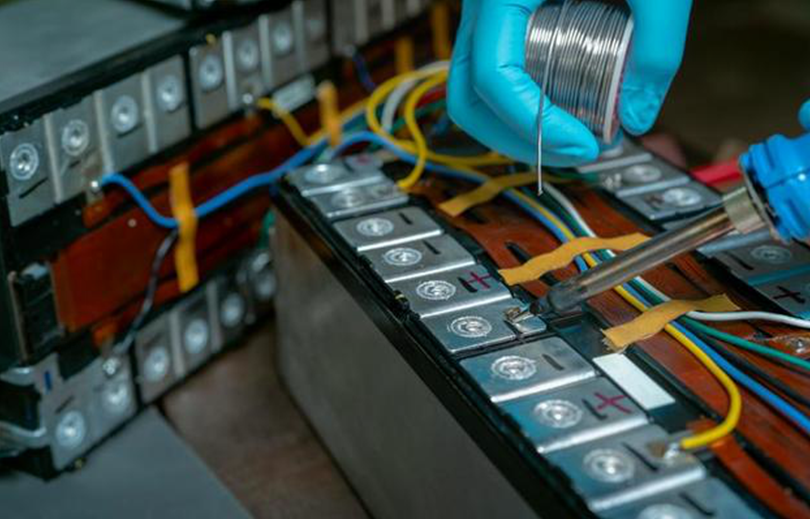Lithium Ion Battery: Revolutionizing Energy Storage Technology
Introduktion
The demand for energy storage has been increasing rapidly in recent years due to the widespread adoption of renewable energy sources and the need for efficient electric vehicles. One technology that has been at the forefront of this revolution is the lithium-ion battery. This article will explore the significance of lithium-ion batteries in revolutionizing energy storage technology.
Background
Lithium-ion batteries were first introduced in the 1970s, but it was not until the 1990s that they gained commercial success. This breakthrough technology quickly became the preferred choice for portable electronic devices such as laptops and smartphones due to its high energy density and long cycle life.
Advantages of Lithium-ion Batteries
Lithium-ion batteries offer several advantages over other types of rechargeable batteries. Firstly, they have a higher energy density, meaning they can store more energy in a smaller size and weight. This makes them ideal for portable electronic devices and electric vehicles, where weight and space are critical factors.
Secondly, lithium-ion batteries have a low self-discharge rate compared to other battery chemistries. This means they can retain their charge for a longer time when not in use, making them more efficient and reliable.
Furthermore, lithium-ion batteries have a longer cycle life, meaning they can be charged and discharged many times before their performance significantly degrades. This makes them more cost-effective in the long run compared to other battery types.
Applications of Lithium-ion Batteries
The applications of lithium-ion batteries have expanded beyond portable electronic devices. Electric vehicles are one of the most significant areas where lithium-ion batteries have had a revolutionary impact. The ability of lithium-ion batteries to provide high energy density and fast charging capabilities has made electric vehicles more practical and appealing to consumers.
Another significant application is in renewable energy storage. Lithium-ion batteries can store excess energy generated from renewable sources like solar or wind power and release it when the demand is higher or when the renewable source is not available. This helps to stabilize the power grid and promotes the integration of renewable energy into the existing infrastructure.
Challenges and Future Developments
While lithium-ion batteries have revolutionized energy storage technology, there are still some challenges that need to be addressed. One of the main challenges is the limited availability of lithium resources. The demand for lithium-ion batteries has been growing rapidly, and finding sustainable sources of lithium is crucial for the industry’s future.

Another challenge is the safety concerns associated with lithium-ion batteries. Although rare, incidents of battery fires or explosions have been reported. Researchers and manufacturers are continuously working on improving the safety features of lithium-ion batteries to minimize these risks.
In terms of future developments, researchers are exploring new materials and technologies to improve the performance and energy density of lithium-ion batteries further. Graphene, for example, is being investigated as a potential replacement for traditional graphite anodes, which could lead to even higher energy densities.
Konklusion
Lithium-ion batteries have revolutionized energy storage technology and have become an essential component in various applications. Their high energy density, long cycle life, and fast charging capabilities have made them the preferred choice for portable electronic devices and electric vehicles. Furthermore, the ability to store renewable energy has facilitated the integration of renewable sources into the existing power grid. While there are challenges to overcome, the future looks promising with ongoing research and developments in this field. Lithium-ion batteries will continue to play a crucial role in shaping the future of energy storage technology.
-
 In today's fast-paced world, we rely heavily on technology to get us through our daily lives. Whether it's charging our smartphones, powering our laptops or driving our cars, we need a reliable source of power to keep us going. This is where the 12V LiFePO4 battery comes in. In this article, we will explore the benefits of using a 12V...Læs mere
In today's fast-paced world, we rely heavily on technology to get us through our daily lives. Whether it's charging our smartphones, powering our laptops or driving our cars, we need a reliable source of power to keep us going. This is where the 12V LiFePO4 battery comes in. In this article, we will explore the benefits of using a 12V...Læs mere -
 In today's fast-paced world, staying connected and having access to power is more important than ever. Whether you are on a camping trip, working remotely, or simply going about your daily routine, having a reliable power source for your devices is crucial. This is where the high capacity 12V 200Ah LiFePO4 lithium battery comes into play. With its efficient power...Læs mere
In today's fast-paced world, staying connected and having access to power is more important than ever. Whether you are on a camping trip, working remotely, or simply going about your daily routine, having a reliable power source for your devices is crucial. This is where the high capacity 12V 200Ah LiFePO4 lithium battery comes into play. With its efficient power...Læs mere -
 Portable jump starter battery packs are a must-have for anyone who drives a car. These battery packs are designed to provide an emergency power source to jump start your car when your battery dies. They are compact, lightweight, and easy to carry around in your car, making them perfect for long road trips, camping trips, or just for everyday use....Læs mere
Portable jump starter battery packs are a must-have for anyone who drives a car. These battery packs are designed to provide an emergency power source to jump start your car when your battery dies. They are compact, lightweight, and easy to carry around in your car, making them perfect for long road trips, camping trips, or just for everyday use....Læs mere -
 Lithium Iron Phosphate (LiFePO4) is a type of lithium-ion battery that has been in use since the year 1996. It has rapidly gained popularity in the recent years due to its exceptional features and benefits that sets it apart from other types of lithium-ion batteries available on the market. In this report, we will take an in-depth look at the...Læs mere
Lithium Iron Phosphate (LiFePO4) is a type of lithium-ion battery that has been in use since the year 1996. It has rapidly gained popularity in the recent years due to its exceptional features and benefits that sets it apart from other types of lithium-ion batteries available on the market. In this report, we will take an in-depth look at the...Læs mere -
 In today's world, energy storage is becoming increasingly important as we strive towards a more sustainable future. With the rise of renewable energy sources such as wind and solar power, there is a growing need for efficient and reliable energy storage solutions. One promising technology that is emerging as a leading contender in this field is the lithium iron phosphate...Læs mere
In today's world, energy storage is becoming increasingly important as we strive towards a more sustainable future. With the rise of renewable energy sources such as wind and solar power, there is a growing need for efficient and reliable energy storage solutions. One promising technology that is emerging as a leading contender in this field is the lithium iron phosphate...Læs mere -
 For years, lead-acid batteries have been the go-to for energy storage solutions due to their affordability and availability. However, as technology continues to advance, lithium-ion batteries like the 100Ah Lithium Battery Lifepo4 are revolutionizing the energy storage market. The 100Ah Lithium Battery Lifepo4 is a type of lithium-ion battery that is commonly used for energy storage in residential and...Læs mere
For years, lead-acid batteries have been the go-to for energy storage solutions due to their affordability and availability. However, as technology continues to advance, lithium-ion batteries like the 100Ah Lithium Battery Lifepo4 are revolutionizing the energy storage market. The 100Ah Lithium Battery Lifepo4 is a type of lithium-ion battery that is commonly used for energy storage in residential and...Læs mere -
 Introduction: In recent years, the demand for seamless and uninterrupted communication networks has surged, especially with the increasing reliance on mobile devices and the internet. However, ensuring reliable network coverage in remote areas or during power outages remains a challenge. In response, the implementation of lithium battery-powered base stations has emerged as a viable solution. This article delves into the...Læs mere
Introduction: In recent years, the demand for seamless and uninterrupted communication networks has surged, especially with the increasing reliance on mobile devices and the internet. However, ensuring reliable network coverage in remote areas or during power outages remains a challenge. In response, the implementation of lithium battery-powered base stations has emerged as a viable solution. This article delves into the...Læs mere

